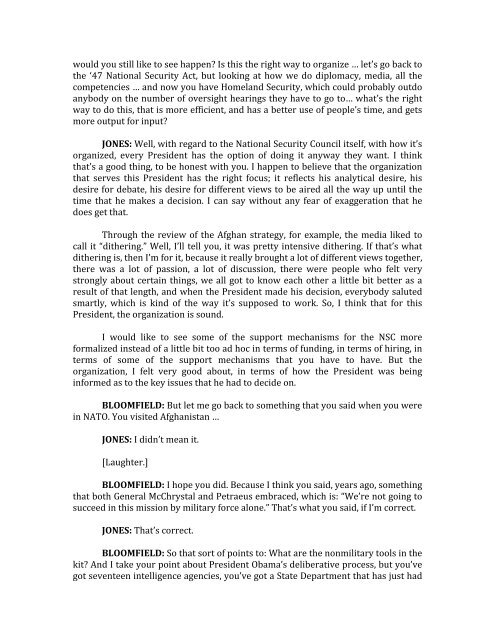Interview of GENERAL JAMES L. JONES, USMC - The Stimson Center
Interview of GENERAL JAMES L. JONES, USMC - The Stimson Center
Interview of GENERAL JAMES L. JONES, USMC - The Stimson Center
You also want an ePaper? Increase the reach of your titles
YUMPU automatically turns print PDFs into web optimized ePapers that Google loves.
would you still like to see happen? Is this the right way to organize … let’s go back to<br />
the ‘47 National Security Act, but looking at how we do diplomacy, media, all the<br />
competencies … and now you have Homeland Security, which could probably outdo<br />
anybody on the number <strong>of</strong> oversight hearings they have to go to… what’s the right<br />
way to do this, that is more efficient, and has a better use <strong>of</strong> people’s time, and gets<br />
more output for input?<br />
<strong>JONES</strong>: Well, with regard to the National Security Council itself, with how it’s<br />
organized, every President has the option <strong>of</strong> doing it anyway they want. I think<br />
that’s a good thing, to be honest with you. I happen to believe that the organization<br />
that serves this President has the right focus; it reflects his analytical desire, his<br />
desire for debate, his desire for different views to be aired all the way up until the<br />
time that he makes a decision. I can say without any fear <strong>of</strong> exaggeration that he<br />
does get that.<br />
Through the review <strong>of</strong> the Afghan strategy, for example, the media liked to<br />
call it “dithering.” Well, I’ll tell you, it was pretty intensive dithering. If that’s what<br />
dithering is, then I’m for it, because it really brought a lot <strong>of</strong> different views together,<br />
there was a lot <strong>of</strong> passion, a lot <strong>of</strong> discussion, there were people who felt very<br />
strongly about certain things, we all got to know each other a little bit better as a<br />
result <strong>of</strong> that length, and when the President made his decision, everybody saluted<br />
smartly, which is kind <strong>of</strong> the way it’s supposed to work. So, I think that for this<br />
President, the organization is sound.<br />
I would like to see some <strong>of</strong> the support mechanisms for the NSC more<br />
formalized instead <strong>of</strong> a little bit too ad hoc in terms <strong>of</strong> funding, in terms <strong>of</strong> hiring, in<br />
terms <strong>of</strong> some <strong>of</strong> the support mechanisms that you have to have. But the<br />
organization, I felt very good about, in terms <strong>of</strong> how the President was being<br />
informed as to the key issues that he had to decide on.<br />
BLOOMFIELD: But let me go back to something that you said when you were<br />
in NATO. You visited Afghanistan …<br />
<strong>JONES</strong>: I didn’t mean it.<br />
[Laughter.]<br />
BLOOMFIELD: I hope you did. Because I think you said, years ago, something<br />
that both General McChrystal and Petraeus embraced, which is: “We’re not going to<br />
succeed in this mission by military force alone.” That’s what you said, if I’m correct.<br />
<strong>JONES</strong>: That’s correct.<br />
BLOOMFIELD: So that sort <strong>of</strong> points to: What are the nonmilitary tools in the<br />
kit? And I take your point about President Obama’s deliberative process, but you’ve<br />
got seventeen intelligence agencies, you’ve got a State Department that has just had
















